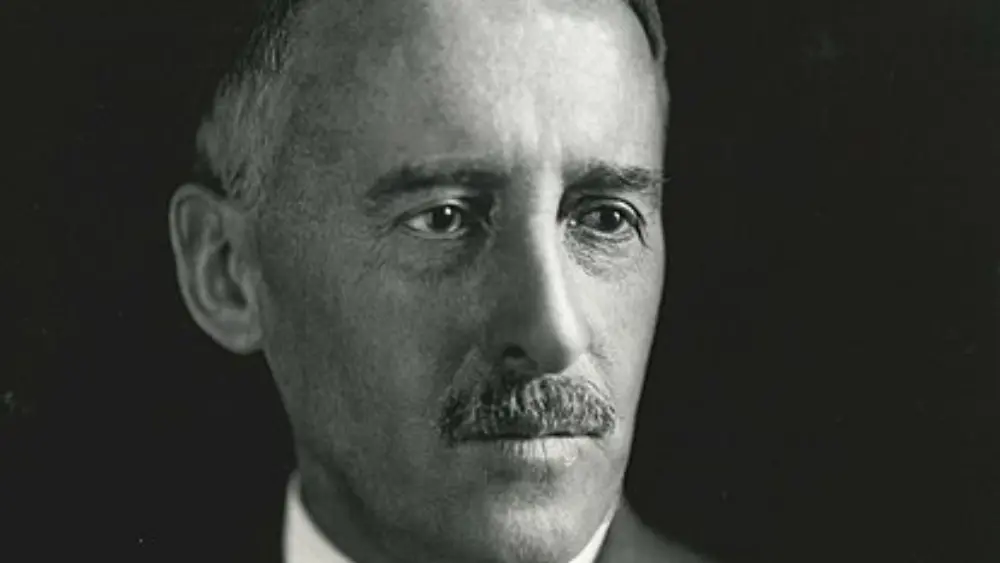Henry L. Stimson, a key figure in U.S. foreign policy during the 1930s and ’40s, held significant influence, serving under five presidents from 1911 to 1945. He was admitted to the New York Bar in 1891 and served in various roles, including as U.S. attorney for the southern district of the state. Moreover, Stimson served as secretary of war under President Taft and fought in World War I. He also mediated civil disputes, notably in Nicaragua, and served as governor-general of the Philippine Islands from 1927 to 1929.
Early Life and Education: The Formation of a Statesman
Born In 1867 in Manhattan, New York City, Henry L. Stimson was the son of Lewis Atterbury Stimson, a renowned surgeon, and Candace Thurber Wheeler. His mother’s death when he was nine led to his enrollment in boarding school. Summers were spent at his grandmother’s Catskills home, where he bonded with his uncle Dunham Wheeler. Exploring the mountains, Stimson developed a passion for the outdoors, becoming an enthusiastic sportsman and enjoying playful times with his uncle in “the Armory,” a section of the house.
Henry’s educational journey began at Phillips Academy in Andover, Massachusetts, where he fostered a deep interest in religion and formed a close connection with the institution. Later, he generously bequeathed his Washington, D.C. estate, Woodley, to the school. Throughout his academic pursuits at Yale College and Harvard Law School, Stimson’s involvement in prestigious societies like Skull and Bones enriched his experiences. He was mentored by Elihu Root and embarked on a distinguished legal career at the renowned firm Root and Clark, profoundly influenced by Root’s guidance and leadership.
Henry Stimson: A Commitment to Public Service
Henry L. Stimson’s commitment to public service was a defining aspect of his career from the outset. Following his education, he entered the realm of public service, where he merged his legal expertise with a dedication to serving the nation. Stimson’s early career reflected a sense of duty and a recognition of the importance of contributing to the greater good.
Stimson’s commitment to public service manifested in various roles, including his service in the U.S. Attorney’s Office for the Southern District of New York and as the United States Attorney for the Southern District of New York. These early experiences not only showcased his legal acumen but also laid the groundwork for his future roles in more prominent and impactful positions within the U.S. government. Stimson’s commitment to public service would later lead him to serve as the Secretary of War in multiple administrations, where he played a crucial role in shaping U.S. military policy during critical periods, including World War II.
Public Service Career: From Prosecutor to Diplomat
Henry L. Stimson’s public service career commenced with distinction as the U.S. Attorney for the Southern District of New York. In this role, he earned a reputation for his tenacity in prosecuting cases involving corrupt political figures, showcasing his commitment to justice and the rule of law. Stimson’s efforts in maintaining the highest standards of integrity caught the attention of presidents, marking the beginning of his journey from prosecutor to diplomat.
Stimson’s adeptness and dedication to public service were further recognized when he transitioned to diplomatic roles. His exemplary service as the U.S. Minister to Japan and later as the Secretary of State underscored his versatility and ability to navigate complex international relations. This trajectory in his career highlighted Stimson’s enduring commitment to serving his country, whether in the courtroom or on the global diplomatic stage.
Henry Stimson: The Philippines and East Asia Diplomacy
Henry L. Stimson’s diplomatic portfolio expanded significantly when he assumed the role of Governor-General of the Philippines under President William Howard Taft. During his tenure in the early 20th century, Stimson played an important role in overseeing the administration of the Philippines. He exhibited his administrative skills and commitment to effective governance. His service in this capacity allowed him to engage with the complex dynamics of East Asia, laying the groundwork for his later diplomatic contributions to the region.
In his diplomatic endeavors in East Asia, Stimson demonstrated a nuanced understanding of international relations and a commitment to fostering stability. His approach sought to navigate the intricate geopolitical landscape, promoting cooperation and dialogue. Stimson’s efforts in the Philippines and broader East Asia showcased his diplomatic skills and demonstrated his commitment to fostering positive relationships.
World War I Service: Mobilizing for the Conflict
Henry L. Stimson’s commitment to public service extended to a pivotal role during World War I when he temporarily set aside his diplomatic career to actively contribute to the war effort. Commissioned as a major in the U.S. Army, Stimson brought his administrative prowess to the forefront, playing a crucial role in mobilizing resources and coordinating logistics. His efforts contributed to the efficient organization of military operations, reflecting his dedication to the nation’s defense during a critical period in global history.
As a major in the U.S. Army during World War I, Stimson’s responsibilities extended beyond the battlefield, emphasizing the importance of strategic planning and effective logistical support. His wartime service showcased his versatility and ability to adapt to different roles in the pursuit of national security. Stimson’s contributions during this period were a testament to his sense of duty and his willingness to leverage his skills wherever they were most needed for the benefit of the United States.
Henry Stimson: Dedication to the War Effort
Henry L. Stimson’s dedication to the nation’s defense during World War I became evident through his significant contributions to the war effort. As a major in the U.S. Army, Stimson showcased exceptional organizational skills and leadership qualities. His commitment extended beyond the traditional military roles, as he played a crucial part in coordinating logistics and mobilizing resources for the war. Stimson’s dedication during this period laid the groundwork for his future roles in shaping U.S. military and national security policies.
The experience gained by Stimson during World War I not only highlighted his effectiveness in crisis management but also provided valuable insights into the complexities of international conflicts. This dedication and hands-on experience would become pivotal in shaping his approach to military and strategic matters in subsequent years, reflecting his enduring commitment to serving the best interests of the United States.
Secretary of War: Leadership During Critical
Henry’s most significant and impactful role came with his appointment as Secretary of War under three different presidents: William Howard Taft, Franklin D. Roosevelt, and Harry S. Truman. Serving in this critical capacity during such crucial periods, Stimson faced the formidable challenges presented by World War II and the early stages of the Cold War. As Secretary of War under Roosevelt, Stimson played a key role in the strategic decisions and military planning that defined the United States’ involvement in World War II, overseeing the mobilization of resources, the development of military strategies, and the coordination of efforts with allied nations.
Stimson’s leadership during these critical times extended into the post-war era, where he continued to contribute to the shaping of U.S. foreign policy and military strategy. His insights into the emerging challenges of the Cold War, coupled with his experience and dedication, made him a vital figure in navigating the complexities of the geopolitical landscape. Stimson’s service as Secretary of War demonstrated not only his ability to lead during times of war but also his commitment to shaping the nation’s defense and security policies during a period of global transformation.
Henry Stimson: Strategic Vision and Policy Formulation
Henry L. Stimson’s tenure as Secretary of War was marked by his strategic vision and dedication to effective policy formulation. Recognizing the gravity of World War II and the need for decisive action, Stimson played a pivotal role in shaping the U.S. military’s approach to the conflict. He advocated for a comprehensive strategy that involved not only the mobilization of forces but also the development of innovative and impactful military technologies.
One of the most consequential aspects of Stimson’s strategic vision was his involvement in the Manhattan Project, the initiative that led to the development of the atomic bomb. Understanding the potential of this groundbreaking technology to hasten the end of the war, Stimson supported its deployment, ultimately leading to the bombings of Hiroshima and Nagasaki. While the use of atomic weapons remains a subject of historical debate, Stimson’s role in their development underscores his commitment to ending the war and his belief in employing new and powerful tools to achieve that objective. Stimson’s strategic insights and contributions to policy during this period reflect a statesman deeply engaged with the challenges of his time.
National Security Leadership: The Truman Years and Beyond
The influence of Henry in national security extended beyond World War II into the Truman administration and the early years of the Cold War. As the Cold War unfolded, Stimson remained a trusted advisor and contributor to key defense policies. His wealth of experience and strategic insight positioned him as a valuable asset. This happened amidst geopolitical tensions and the rise of nuclear weapons as a key factor in global power dynamics.
During the Truman years, Stimson played a crucial role in shaping the United States’ response to the evolving Cold War challenges. As the world grappled with the ideological and military confrontation between the United States and the Soviet Union, Stimson’s leadership contributed to the formulation of policies that aimed to safeguard national security interests. His continued dedication to public service was remarkable. His ability to navigate complex international relations solidified his legacy as a statesman. He played a vital role in shaping the trajectory of U.S. national security during a critical juncture in history.
Henry Stimson: Advocacy for Collective Security
Henry L. Stimson’s commitment to global stability was prominently manifested in his advocacy for collective security and the establishment of international organizations. Recognizing the need for a framework that could prevent future conflicts and promote cooperation among nations, Stimson played a crucial role in the formation of the United Nations (UN). As the United States representative during the drafting of the UN Charter in San Francisco in 1945, Stimson worked to create an international body that would foster diplomacy, prevent aggression, and address global challenges through collective action.
Stimson’s vision for collective security extended beyond the immediate post-war period. He understood the importance of creating a lasting framework that could withstand the complexities of international relations. His diplomatic efforts and commitment to multilateralism set the stage for the United Nations to become a cornerstone of global governance, emphasizing the shared responsibility of nations in maintaining peace and security on a global scale. Stimson’s advocacy for collective security remains a testament to his foresight and dedication to building a more stable and cooperative world order.

Legacy and Recognition: Contributions to American Diplomacy
Henry L. Stimson’s legacy is indelibly marked by his significant contributions to American diplomacy and national security. Throughout his distinguished career, Stimson played pivotal roles in shaping U.S. foreign policy, serving as a key architect during crucial periods such as World War II and the early years of the Cold War. His strategic thinking and leadership as Secretary of War under Presidents William Howard Taft, Franklin D. Roosevelt, and Harry S. Truman left an indelible mark on the nation’s defense apparatus.
Stimson’s recognition extends beyond his governmental roles, as he remains a revered figure in diplomatic and military circles. His advocacy for collective security, instrumental role in the establishment of the United Nations, and commitment to effective policy formulation underscore his enduring influence on American diplomacy. Stimson’s legacy is a testament to the enduring impact that a dedicated public servant can have on shaping the trajectory of a nation and contributing to the broader principles of international cooperation and peace.




